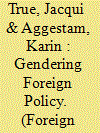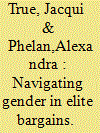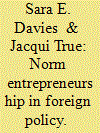| Srl | Item |
| 1 |
ID:
184226


|
|
|
|
|
| Summary/Abstract |
This article seeks to explain the rise of pro-gender norms and feminist strategies in foreign policy, which are increasingly salient in global politics. How can this trend be theorized? In what ways is this development resisted and contested by other states and international actors? To what extent can we trace continuity and change in regard to gender and foreign policy? To address these major research questions and to spur cross-national comparative studies, this article advances a theoretical framework on gendering foreign policy. It draws on two strands of research, which rarely engage with one another: international feminist theory (IFT) and foreign policy analysis (FPA). We identify three ways in which comparative analysis of gender in foreign policy can be advanced: first, by highlighting the variations of pro-gender norms and enhancing the analytical assessment of cross-national trends; second, by generating a more robust explanation of the rise, embeddedness, and continuity of, as well as resistance to, pro-gender norms in foreign policy in similar and diverse contexts; and third, by examining both continuity and change in pro-gender norms in order to reveal the contestation around gender, which is at the heart of foreign policy.
|
|
|
|
|
|
|
|
|
|
|
|
|
|
|
|
| 2 |
ID:
183707


|
|
|
|
|
| Summary/Abstract |
A growing body of scholarship connects the participation of women and the inclusion of gender provisions to the sustainability of peace settlements. But how do women's groups navigate gender power structures and gendered forms of violence within complex and fragile political bargaining processes aimed at ending large-scale conflict? The 2016 Colombian peace agreement, internationally applauded for its inclusion of strong gender provisions and women's participation as negotiators and peace advocates, is a significant case for examining these questions. Drawing on original case material, including interviews of key actors on different sides of the conflict – this article analyses the political bargaining dynamics within and among women's movements, the Santos government and the Revolutionary Armed Forces of Colombia (Fuerzas Armadas Revolucionarias de Colombia, FARC). We argue that the inclusion of women was pivotal in transforming the elite bargaining process and power structures of Colombian society enabling a gender-based approach to the substantive peace agenda addressing transitional gender justice for sexual violence survivors and gender-equal redistribution through land and rural reform programmes. The study suggests that deeply situated political bargaining analysis is essential to navigating gender in elite bargains rather than a one-size-fits-all approach to inclusive peace.
|
|
|
|
|
|
|
|
|
|
|
|
|
|
|
|
| 3 |
ID:
153433


|
|
|
|
|
| Summary/Abstract |
Theories of international norm diffusion rely on accounts of entrepreneurial action almost exclusively identified as normative non-state actors who persuade powerful states to change their behaviour. We argue that powerful state agents can (also) be moral norm entrepreneurs and explicate the foreign policy acts that make them significant agents of international socialisation. Unlike non-state actors who set the agenda by advocating for new norms, foreign policy leaders leverage their identity and position to advance the recognition and diffusion of already established norms by reframing the moral prerogative of the ‘national interest’. The paper examines a prominent case, namely former British foreign secretary, Mr. William Hague's promotion, through the offices of the British Foreign Commonwealth, of the international norm prohibiting use of sexual violence in conflict. We ask why and how did the United Kingdom and William Hague devote the attention and resources of the foreign policy apparatus to further this norm established more than a decade earlier in the Rome Statute of the ICC and by gender justice advocates?
|
|
|
|
|
|
|
|
|
|
|
|
|
|
|
|